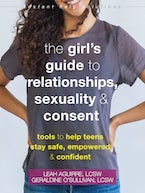By Leah Aguirre, LCSW, coauthor of The Girl’s Guide to Relationships, Sexuality, and Consent
Where did you learn about relationships? Not sex—but relationships. For me as a kid and teen, most of my knowledge came from various media sources—TV shows, Disney movies and rom-coms, and pop music. Occasionally, I would refer to magazines like Cosmo which were wildly inappropriate (and misogynistic) at the time, as many of the articles focused on how to please your male partner alongside pictures of flawless celebrities and supermodels. And I would also consult with my friends—who were of course no more knowledgeable about relationships than I was at the time.
Basically, I had very few conversations with adults about the topic, and little to no formal education about relationships and what it means to be in a healthy relationship. Sex education was (and continues to be) very limited in scope, focusing solely on how to practice safe sex versus how to pursue and establish healthy and meaningful relationships, communicate effectively, and assert oneself and one’s boundaries. There was some discussion of “consent” and “rape,” but it was brushed over, and didn’t account for the complexities of relationships or offer skill building to encourage assertiveness and healthy decision-making.
Today, while there has been some forward movement and shift in the culture in how we talk about sex and relationships, the resources and conversations we have with our teens are still very limited. As a therapist who works with both teens and young adults, I continue to see the impact of this on our younger generation’s mental health. Young people are really struggling with developing healthy body image, identity, and self-worth. And with social media, there is an added layer of vulnerability to misinformation, peer pressure, unhealthy relationship dynamics, and sexual exploitation.
With all of this in mind, it is so important to have open and candid conversations with kids and teens about relationships. While I know it can be incredibly awkward and uncomfortable, the more we, as safe adults, create spaces and opportunities for these conversations, the more we empower youth to make safe and informed decisions when it comes to dating and sexuality.
So, how can you position yourself as a safe adult to a young person who is in need of support? Here are some ideas:
1. Make it known that you are available to talk to about relationships, and that you want to be there for this young person. Make sure you are clear in your words, and direct. For example, tell the young person, “I am here for you at any time if you ever want to talk about dating, sex, or relationships.”
2. If you feel ill-equipped to talk about certain things like sex or sexuality, help this young person connect to someone who will be an appropriate and helpful support, like a licensed therapist or school social worker. Or maybe there is another safe adult in your young person’s life (e.g., a cousin, or a friend’s parent) who will be more comfortable talking about this sensitive topic that you can connect them to.
3. Offer the young person resources like our self-help book—The Girl’s Guide to Relationships, Sexuality, and Consent—or online tools such as www.loveisrespect.org.
Leah Aguirre, LCSW, is a licensed clinical social worker practicing in San Diego, CA. She works primarily with teens and adults who have experienced complex trauma, including childhood abuse, domestic violence, and dating violence; and provides trauma-based treatment, including eye movement desensitization and reprocessing (EMDR). Aguirre writes a blog on Psychology Today, and has been featured in Bumble, GQ, The San Diego Union-Tribune, and in the Reframe and DiveThru apps.



 2024 Peace Playbook: 3 Tactics to Avoid Clashes with Your Partner
2024 Peace Playbook: 3 Tactics to Avoid Clashes with Your Partner